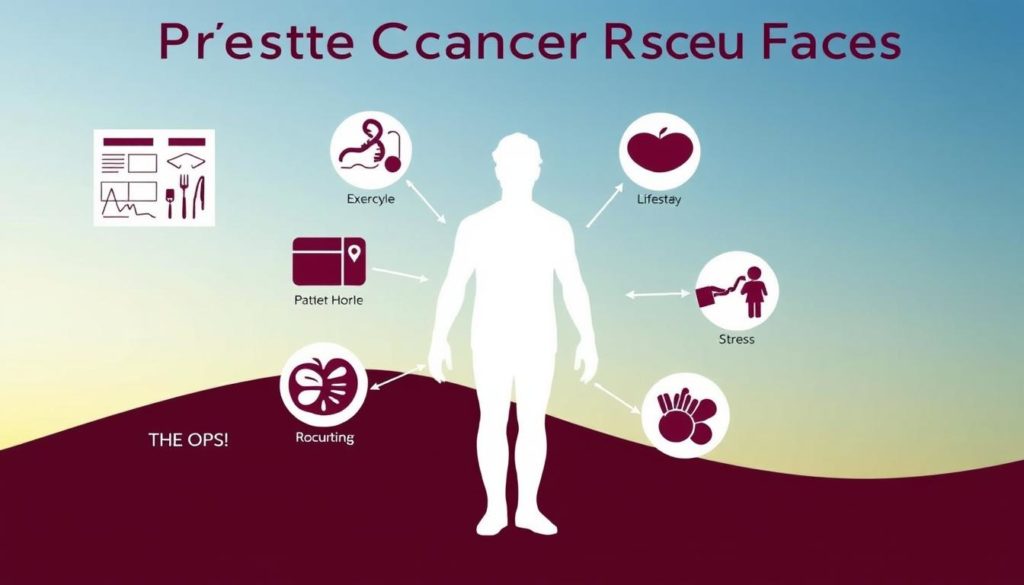Preventing prostate cancer from coming back is key for survivors. The aim is to live a life free of cancer. Even with a high 5-year survival rate, it’s important to stay careful.
A strong plan for after cancer treatment helps lower the risk. This should include eating better, staying active, and taking the right meds. These steps can greatly reduce the chance of cancer returning.
Understanding Prostate Cancer Recurrence
Prostate cancer recurrence is a major worry for those treated for it. After treatment, cancer can come back, so continuous monitoring is key. Knowing what increases the risk of recurrence helps in planning how to prevent or treat it.

What is Prostate Cancer Recurrence?
Prostate cancer can return after treatment, even if one has been cancer-free. It’s often caught through higher PSA levels or tests. Early treatment can greatly enhance life quality.
Statistics on Recurrence Rates
The survival rate for prostate cancer is high, with almost all patients living at least five years after diagnosis for local tumors. Recurrence rates do differ greatly. They depend on the cancer’s stage when found, treatment type, and patient-specific risk factors.
| Factor | Recurrence Rate |
|---|---|
| Localized Cancer | Up to 10% |
| Advanced Cancer | 30-40% |
| Surgical Treatment | 15-20% |
| Radiation Therapy | 20-30% |
Knowing about recurrence rates helps in making better prevention and treatment choices. It’s crucial for doctors and patients to work together on this.
Dietary Changes to Lower Recurrence Risk
Starting a cancer-prevention diet can help prostate cancer survivors lower their chance of recurrence. Eating a mix of fruits and vegetables, whole grains, while skipping harmful foods is key. We’ll look into the key benefits and foods to eat or avoid.
Benefits of a Cancer-Prevention Diet
A diet aimed at preventing cancer recurrence is full of important nutrients. It includes lots of colorful fruits and vegetables for antioxidants and fiber. These are linked to better health. Eating well also helps in managing weight, which can further reduce the risk of cancer coming back.

Foods to Include: Fruits, Vegetables, and Whole Grains
Eating whole grains and various fruits and vegetables is the diet’s core. Key foods to add are:
- Whole Grains: Brown rice, quinoa, whole wheat bread.
- Fruits: Berries, citrus fruits, apples.
- Vegetables: Leafy greens, cruciferous vegetables, bell peppers.
These items are packed with vitamins, minerals, and antioxidants. They help the immune system and improve health.
Foods to Avoid: Saturated Fats and Processed Meats
It’s also vital to avoid foods that might raise the chance of cancer returning. Processed meats and saturated fats are foods to cut out. The reason is:
- Saturated Fats: Found in butter, fatty meats, and full-fat dairy; they can cause inflammation and other problems.
- Processed Meats: Foods like sausages, bacon, and deli meats can increase cancer risk. This is due to their preservatives and fat content.
Choosing healthier options over these foods is key for reducing recurrence risk. This approach can make a big difference.
“The main aim is to balance your diet in a way that enhances health and fights cancer recurrence. Make nutritious selections and eat mindfully.”
Exercise as a Prostate Cancer Recurrence Prevention Strategy
Regular exercise is key, not just for fitness. It’s vital for prostate cancer survivors to fend off recurrence. Studies show that staying active greatly reduces the chance of another cancer diagnosis. So, it’s crucial to make exercise a part of your life.
- Boosts Immune Function: Exercise improves immune function. It helps your body fight off cancer cells better.
- Reduces Inflammation: Being active reduces inflammation. Inflammation is linked to cancer getting worse.
- Enhances Overall Health: Apart from fighting cancer, exercise is good for your heart, helps manage weight, and improves your mood.
Survivors should aim for 150 minutes of moderate exercise weekly. Try brisk walking, cycling, or swimming. The aim? It’s not just about living longer. It’s about living a healthier, more vibrant life.
The Role of Medications in Reducing Recurrence
Recent studies have focused on the role of medication in fighting prostate cancer recurrence. Using certain drugs like statins, aspirin, and PARP inhibitors can make a big difference. They help cut down the chance of the cancer coming back and make outcomes better in the long run.
Statins and Their Benefits
Statins aren’t just for cholesterol anymore; they might help with prostate cancer too. Research shows they could lower PSA levels after surgery, which is promising. They’re also linked to better survival rates for those battling this kind of cancer.
The Role of Aspirin
Aspirin is more than just a headache remedy. It’s linked to lower prostate cancer recurrence, especially in Black men. This might be thanks to its ability to fight inflammation, which helps stop cancer cells from growing.
Potential of PARP Inhibitors
PARP inhibitors could be a game-changer in treating prostate cancer, particularly for those with certain genetic changes. They work well with hormone therapy to stop the cancer from returning. Studies are still ongoing, but they’re moving towards making these drugs a key part of treatment.
Importance of Regular Screenings and Follow-Up Care
Staying on top of regular screenings and thorough follow-up care is crucial for people who have survived prostate cancer. Finding any signs of cancer early can lead to much better treatment success. The most important tests for this are PSA testing and digital rectal exams. Both are key to keeping an eye on the health of the prostate.
PSA Testing
PSA tests check for a specific protein in your blood. High levels of this protein could mean prostate cancer or other issues. Regular screenings with PSA tests allow doctors to spot problems early. This means they can start treatment quickly if needed.
Digital Rectal Exams
In a digital rectal exam, a doctor checks the prostate by hand to find any oddities. These exams are crucial because they can find issues that PSA tests might not catch. Having these exams regularly, along with PSA tests, forms a strong defense in follow-up care.
Lifestyle Changes to Support Prostate Cancer Survivorship
Making key lifestyle changes is crucial for prostate cancer survivors. By choosing healthier habits, your overall health improves. This can also lower the chance of the cancer coming back.
Quit Smoking
Stopping smoking is a must for those who’ve had prostate cancer. It helps reduce inflammation and strengthens the immune system, which is key for long-term health. Also, not using tobacco products greatly reduces the risk of cancer making a comeback.
Moderate Alcohol Consumption
Limiting alcohol is another important step. Drinking too much can harm the immune system and raise the risk of other health issues. By drinking less, you boost your body’s balance and defense against cancer returning.
Maintain a Healthy Weight
Keeping a healthy weight is essential for your overall health and beating cancer. A healthy weight decreases inflammation and boosts the immune system. This makes it simpler for your body to fight off any remaining cancer cells.
Vitamins and Supplements: Helpful or Harmful?
Many people use supplements, hoping to boost their health. But when it comes to stopping prostate cancer from coming back, we need to look more closely. Vitamin D is often said to help protect against prostate cancer. Some studies suggest that having enough vitamin D might lower the chance of the cancer returning, but it’s not a sure thing for everyone.
Before you start taking any supplements, it’s important to talk to a doctor. Antioxidants can be good for your health, but taking too many through supplements might not be a great idea. It’s best to get the nutrients you need without overdoing it.
When thinking about using vitamins and supplements, keep these points in mind:
- Consult healthcare professionals: Always get a professional opinion before starting any vitamin D or other supplement regimen.
- Natural sources: Where possible, derive vitamins from natural food sources to avoid excessive intake.
- Balance and moderation: Strive for a balanced diet that supports overall health and cancer prevention.
Making smart choices, including a balanced diet, careful supplement use, and listening to doctors, is the best way to possibly lower the risk of prostate cancer coming back.
Managing Stress and Mental Health
Managing stress and mental health well is key to lessening the chance of prostate cancer coming back. The stress hormone, cortisol, can affect how well the body fights cancer cell growth. So, it’s very important to use good stress-reduction strategies.
Impact of Stress on Cancer Recurrence
Stress can greatly affect the chance of cancer returning. Cortisol, made more by stress, can make cancer treatments less effective and slow the death of cancer cells. Not only does stress harm your physical health, but it also weakens mental health supports that are crucial for feeling well.
Stress-Reduction Techniques
Using different ways to reduce stress can help your mind and body. Here are some helpful methods:
- Meditation and Mindfulness: These practices can lower stress hormones like cortisol and make your mind clearer.
- Exercise: Being active regularly is a great method to deal with stress and lift your spirits, thanks to endorphins.
- Therapy and Counseling: Getting help from a mental health professional can equip you with the skills to handle stress better.
Adding these methods into your daily life is crucial for stopping prostate cancer from coming back. They help by reducing stress and boosting mental health supports.
Genetic and Environmental Risk Factors: What You Can’t Change
It’s key to know the genetic risk factors and environmental parts that play into prostate cancer. Some things, like how we live, we can change. But, things like our genes, how old we are, and our race, we can’t.
As men age, the chance of getting prostate cancer goes up a lot. Being older and having certain genes are key factors. African American men, for example, are more likely to get this disease. That’s why getting checked early is extra important for them.
Knowing your family’s health history is crucial, especially if prostate cancer is common in it. Our environment, like what we eat and what chemicals we are around, also affects our cancer risk. But, we must remember some risks are out of our hands.
We can fight prostate cancer better when we know about these risks. If you’re at higher risk because of your age and race, being proactive is smart. Check out WebMD for more info on how these factors work together.
Research and Emerging Trends in Prostate Cancer Recurrence Prevention
Recent studies show how diet and medicine might stop prostate cancer from coming back. Researchers are looking into which foods could positively or negatively affect this disease. They’re also working on medicine that targets the cancer more directly and effectively.
New Dietary Studies
Scientists are studying how what we eat influences the chance of prostate cancer returning. They’re finding that diets full of fruits, veggies, and grains might help protect us. These foods have lots of antioxidants and fight inflammation.
They’ve also found cutting back on red and processed meats could reduce cancer recurrence risks. This shows changing our diet is a key part of fighting prostate cancer.
Advances in Medication
There are exciting new drugs being developed for treating prostate cancer. PARP inhibitors are part of this wave, targeting the cancer based on its genetic makeup. This leads to treatments that are more personalized.
Research is also exploring how to combine these new drugs with existing treatments to get even better results. Knowing about these new trends helps both patients and doctors find the best ways to prevent cancer from coming back.
Developing a Personalized Prostate Cancer Survivorship Plan
Creating a plan with your healthcare team is key for prostate cancer survivors. It must meet your unique challenges and needs. This approach ensures your care matches your health and risk factors.
A complete plan includes a healthy diet, staying active, and regular check-ups. It’s important to eat more fruits and veggies and less processed meat to lower risk of the cancer coming back. Stress management is also essential for your overall health.
Keeping up with doctor visits is crucial to track your health and update your care plan as needed. By staying in touch with your healthcare providers, you can build a plan that not only manages your health now but also ensures a better future.
FAQ
What is Prostate Cancer Recurrence?
Prostate cancer recurrence is when cancer comes back after treatment. It can occur in the prostate or elsewhere in the body.
How common is it for prostate cancer to recur?
The 5-year survival rate is nearly 100%. However, there’s still a chance of recurrence. After 10 to 15 years, survival rates are 95% to 98%.
What dietary changes can help lower the risk of prostate cancer recurrence?
To lower risk, eat more fruits, vegetables, and whole grains. Cut down on saturated fats and avoid processed meats.
How does exercise help in preventing prostate cancer recurrence?
Exercise lowers inflammation and boosts the immune system. This improves your health and may reduce cancer recurrence risk.
What medications can assist in reducing prostate cancer recurrence?
Statins, aspirin, and PARP inhibitors may help. Statins lower PSA levels, aspirin reduces recurrence, and PARP inhibitors work against certain genetic mutations.
Why are regular screenings important after prostate cancer treatment?
Screenings help spot any signs of cancer returning. This allows for quick action to be taken.
What lifestyle changes support prostate cancer survivorship?
Stop smoking, drink less alcohol, and keep a healthy weight. These steps can lower inflammation and improve your overall health.
Are vitamins and supplements helpful or harmful in preventing prostate cancer recurrence?
Vitamin D might help, but too many supplements could be harmful. Always talk to a doctor before starting supplements.
How does stress impact prostate cancer recurrence?
Stress affects how cancer cells die. Managing stress can help improve life quality after treatment.
What genetic and environmental risk factors influence prostate cancer recurrence?
Age, race, and genetics are factors. African American men and those with a family history of prostate cancer are at higher risk and should consider early screening.
What are the latest research and emerging trends in preventing prostate cancer recurrence?
Research focuses on diet’s role and developing drugs like PARP inhibitors for specific genetics.
How can a personalized prostate cancer survivorship plan be developed?
Work with a healthcare team to create a plan. It should consider your health and lifestyle, focusing on diet, exercise, screenings, and mental health.


